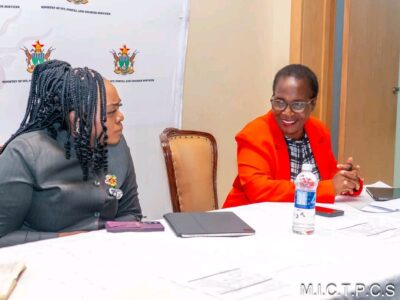In a bold and forward-looking address delivered at the opening of the Artificial Intelligence for Africa Summit on August 18, 2025, Zimbabwe’s Minister of ICT, Postal and Courier Services, Honourable Tatenda Annastacia Mavetera, declared that Africa is no longer content to trail behind in the global technology race. From the symbolic location of Victoria Falls, she announced that the continent is ready to lead in the AI era—not as passive adopters of foreign systems, but as creators, collaborators, and innovators of technology tailored for African realities.
“We are not here to debate whether AI will shape our future. We are here to ensure that Africa itself shapes AI for our future,” she said, capturing the urgent tone of a continent standing at the cusp of a technological renaissance.
Artificial Intelligence, she noted, has evolved into one of the most transformative forces of the 21st century—on par with the invention of the printing press or the discovery of electricity. For Zimbabwe and other African nations, AI represents not just innovation but a path toward economic sovereignty, social inclusion, and developmental acceleration.
Zimbabwe has already begun laying the groundwork for this transformation. The country recently inaugurated the second phase of its High-Performance Computing Centre, now with a capacity of 559 Peta-Flops—placing it among the most powerful on the continent. Complementing this is the expansion of the National Data Centre and the implementation of a National Enterprise Architecture Model to govern how data is collected, stored, and used responsibly.
The nation’s focus on AI skills development is equally aggressive. The 1.5 Million Coders Program aims to equip citizens across all provinces with digital skills, regardless of educational background or location. Policymakers, too, are being trained through specialised AI literacy programs, while the Digital Skills Ambassadors initiative will soon begin rolling out intensive youth training, specifically in artificial intelligence, across Zimbabwe.
“Inclusive innovation must not be a slogan,” said Minister Mavetera. “It must be a design principle. No one and no place should be left behind.”
The Minister also confirmed that Zimbabwe’s National AI Strategy has been finalised and will be publicly launched in October 2025. Its release is expected to solidify the country’s AI governance frameworks, ensuring ethical implementation, contextual relevance, and national security.
Infrastructure is another key pillar in Zimbabwe’s digital roadmap. The country is scaling up 5G deployment, expanding fibre optic coverage, and exploring Low Earth Orbit (LEO) satellite technologies to increase connectivity in remote regions. These efforts underpin Zimbabwe’s broader vision of becoming an upper-middle-income economy by 2030, with AI acting as a strategic enabler.
But Minister Mavetera’s address went far beyond national priorities. She positioned AI as a pan-African mission. She warned against digital neo-colonialism, where African nations rely entirely on AI tools built with foreign data and foreign interests. Quoting Speaker of Parliament Advocate Jacob Mudenda, she stressed: “Dependence on externally developed AI systems, without local contextualisation and oversight, may reinforce existing inequalities and compromise national sovereignty.”
Instead, she called for a unified African voice on AI—one rooted in local languages, cultural nuance, and indigenous problem-solving. “An AI built on foreign data will not understand the tones of our communities,” she cautioned.
Examples of success were cited from across the continent: AI is helping Kenyan farmers predict weather patterns, enabling Botswana to protect endangered wildlife, and powering fintech innovation in Nigeria. Zimbabwe, too, is leveraging AI in agriculture and personalised education. The challenge now, she said, is not invention but scaling—ensuring that local successes become continental solutions.
Minister Mavetera also addressed concerns about AI and employment. She acknowledged that automation will inevitably displace some jobs, but argued that the future lies in job transformation, not job loss. AI should free up teachers to teach, doctors to heal, and small businesses to thrive using tools once available only to multinationals. “If we prepare wisely,” she said, “AI will not take Africa’s jobs—it will create Africa’s opportunities.”
She issued a powerful call for gender inclusion in the tech sector, highlighting the underrepresentation of women in AI development and innovation. She praised pioneering women at the Summit, such as Ms. Ruth Gorerokufa and Ms. Gloria Ndoro-Mukombachoto, but made it clear that the work of achieving true equity is far from over. “An Africa that leaves out women in AI is at a disadvantage,” she said.
Throughout her speech, the Minister connected Zimbabwe’s and Africa’s AI journey to broader visions: the African Union’s Agenda 2063, SADC’s Vision 2050, the UN Sustainable Development Goals, and Zimbabwe’s Vision 2030. All align on one key idea: innovation is the lever that will unlock Africa’s potential.
She closed with a challenge to delegates to take personal responsibility for learning and leading in the AI space. Quoting Strive Masiyiwa, she asked, “What books have YOU read on AI? What courses have YOU taken?”
With that, she officially declared the AI for Africa Summit open—not just as a ceremonial gathering, but as the launchpad of a movement that aims to reframe Africa’s role in the Fourth Industrial Revolution.
“Africa’s moment is here,” she said, her voice unwavering. “And together, we will seize it.”















Comments